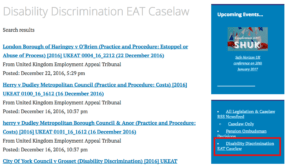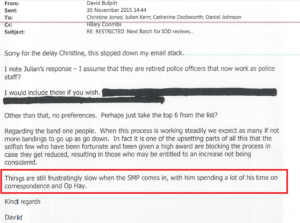During the festive period we didn’t waste valuable Quality-Street-eating or telly-gazing time. Our investigative columnist was simultaneously scoffing chocolates and watching Dr Who whilst trawling our archives.
We’ve dusted off a letter from Julie Spence, the former Chief Constable of Cambridgeshire. As a Chief Constable she made the extraordinary claim was that the guidance in Home Office Circular 46/2004 was mandatory – that she had no choice but to reduce those over 65 years of age to the lowest award and zero percent disability because:
that it is not our job to pick and choose the regulations that we will apply and the ones we will ignore
In a letter written to the local NARPO magazine, Spence was attempting to justify her position, allegedly based on ‘legal advice’ she impudently claims, that the Home Office Guidance that said those over 65 years of age have no capacity to earn was compulsory and it is a cruel irony of life that people are complaining given she is just doing the good the work of restoring order from chaos. Apparently.
Here’s the full letter. Also you can find the text of the letter at the bottom of the post.
Nowadays Notts, Merseyside, Avon & Somerset and Northumbria are currently all following the rule of Spence. Argue black is white and claim what they force upon disabled former and serving officers is mandatory. When it clearly is no such thing.
You might care to bear in mind that Julie Spence has a law degree, which would lead one to presume she should have known full well the true status of Home Office guidance, and if she was in any doubt about the status of HO guidance she had a telephone on her desk which she could have used to call the HO for clarification.
Instead she decided to follow the same nonsense spouted by force solicitors such as Northumbria’s Nicholas “all SMP’s are judges” Wirz and Avon & Somerset’s Daniel “we can only imply threats to suspend awards” Johnson.
In March 2010 she announced her retirement following repeated challenges over her claim and a matter of days after the Home Office advised all forces to suspend reviews – a clear signal of admission that the guidance she insisted was ‘mandatory’ was in fact unlawful.
The unlawfulness of the guidance and the primacy of Regulations was reaffirmed in the Ayres Pension Ombudsman decision, and the judicial reviews of Crudace, Simpson and the consent order made in Slater.
So the next time some HR Director says they have ‘taken legal advice’, just remember, as far as the quality of the advice goes, they would’ve been better off talking to the coffee machine.
letter from our Chief Constable:
Dear Mr MaCallum Congratulations your new role as Chair- man of Cambridgeshire NARPO.
I am sorry that my first letter to you as Chairman is one in which I feel I express my disappointment.
I read with some surprise David Blake’s goodbye message contained in the April NARPO newsletter, and the criticism of me that I “remain intransigent”. I am concerned that this gives your members totally the wrong impression.
If by this it meant that I am bound by statute, regulations or mandatory Home Office guidance on the issue of the payments of injury awards, then I am.
If it means that I Will not tax-payers money where I do not have the authority to do then I agree.
If it means that I Will listen , that I am not prepared to explore avenues that others have progressed, or that I do not appreciate or understand all view points on this issue then I reject the criticism.
As Police Officers each one of your members understands, or should under- stand, that it is not our job to pick and choose the regulations that we will apply and the ones we will ignore.
Sometimes we have to make tough choices about the action we take. As a public service, this is what is expected.
NARPO have asked me to look at options that other forces have used, and I have done that. I have sought legal advice to explore the extent of duty and authority that exists. Further I have sought and received advice about Home Office Guidance that NARPO had advised allows discretion, and been told very clearly that it is mandatory.
I do not call this call this intransigence. I call this living with reality. It is a reality that should have been gripped several years ago and the fact that it was not is yet another symptom Of the fact that Cambridgeshire for many years a failing Force.
It is One Of life’s cruel ironies that we turn on individuals who try their best to restore normal good performance. In fact NARPO would be better directing their criticism to those who were part of the system that allowed that dreadful mess to be created in the first place.
I also need to let you know that despite what been written, every officer who retires from Cambridgeshire Constabulary may have a meeting with me. Many people take up this opportunity, a small number choose not to – that is their choice. If in the future you want to check what the current policy in the force is, please feel free to phone my office and my staff will endeavour to provide all the help you need.
We need to work together and have an dialogue, even over the tough times, where we have to agree to disagree. said, I truly do forward to supporting NARPO and would be grateful if you could rectify any misunderstandings your members may currently have about the force. If it would help please print this letter in any upcoming newsletter.
Julie Spence OBE Bed LLB MA MBA Chief Constable


















Latest Blog Comments